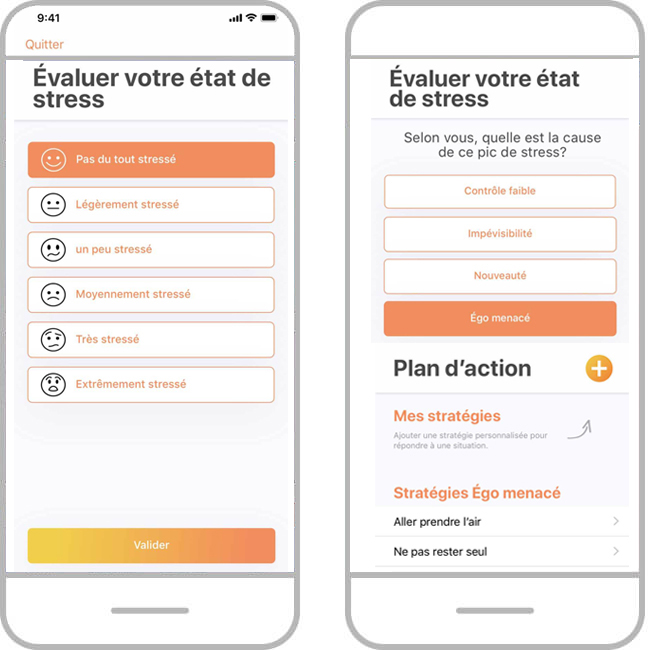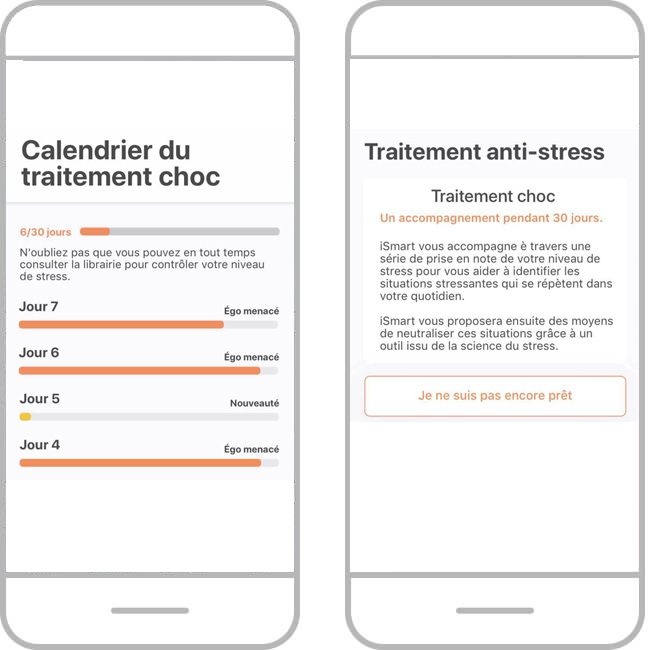iSMART
The iSMART app (which stands for Stress Monitoring Assessment and Resolution Technologies) was developed by mental health researchers to aid people in managing chronic stress by identifying triggers and neutralizing them more effectively.
The iSMART app (which stands for Stress Monitoring Assessment and Resolution Technologies) was developed by mental health researchers to aid people in managing chronic stress by identifying triggers and neutralizing them more effectively.
Chronic stress can be hard to pinpoint as you go through daily life. Once activated, iSMART acts as an intensive stress detection program across a whole month, checking in with you at regular intervals to ask about your stress levels. Based on the data you input over time, it uses an algorithm to determine when you might be most at risk of experiencing chronic stress. The application will ask you to provide details about those instances and suggest ways to neutralize factors that trigger a stress response in you. You’ll be given immediate suggestions on how to alleviate anxiety.


The application comes with short educational video capsules explaining the latest developments in the science of stress.
Through this application, users can monitor their perceived stress levels at regular intervals and then receive proven tips and strategies to help regulate their response to stress.
The application provides a concentrated therapy experience. As part of its treatment regimen, it detects everyday situations that put you at risk for chronic stress and then suggests ways to neutralize factors that trigger a stress response.
of Canadians report that they have relatively stressful days at work on a regular basis.
of adults between the ages of 35 and 44 report that they experience fairly intense stress in life.
of doctors consider depression, anxiety and stress to be the fastest-growing health concerns over the past three years.
billion dollars a year is the estimated cost of presenteeism in the workplace (a known issue among chronic stress sufferers).
Each week, roughly 500,000 Canadians miss work due to chronic-stress-related health issues, which constitutes a major risk for developing further illnesses. Chronic stress develops due to a person’s repeated exposure to a perceived threat, leading to greater wear and tear on our stress response systems. Living with chronic stress is the result of an inability to recognize and control the way our brain perceives situations that occur in our day-to-day lives – almost as if we are viewing them through “stress-coloured lenses”.
With these facts in mind, and with an awareness of the psychoneuroendocrinological features of stress, such as links between stress hormones and memory, Dr. Sonia Lupien embarked on an adventure to develop a tool that would record people’s experience of stress, would detect any risk of chronic stress and would attempt to mitigate it. And that’s how the iSMART’s (Stress Monitoring Assessment and Resolution Technologies) first came into being.
On the Apple Store and Google Play, there are over 300,000 applications that claim to manage people’s health, with around a hundred of those supposedly geared specifically to managing stress. However, none of the applications seem to have been scientifically tested or validated.
All of the acute stress and chronic stress management strategies on iSMART are scientifically grounded. The strategies were validated and developed during two stress intervention programs created for the Centre for Studies on Human Stress, namely DeStress for Success and Stress Inc. Together, these two programs form the Iso-stress project (French only)
The Centre for Studies on Human Stress is internationally renowned for its stress management expertise and for the production and validation of scientifically based chronic stress prevention tools.
iSMART is a free and bilingual (French/English) digital tool to help you better understand your own stress response mechanisms while also learning how to prevent or manage chronic stress – and it’s right at your fingertips!
Ready to tackle your chronic stress?
It’s easy – just download iSMART on your iPhone or Android device and let iSMART do the rest.
iSMART is based on the latest developments in the science of stress so you can regain control over those day-to-day chronic stress triggers. After setting your preferences, iSMART checks in with you at regular intervals to ask about your stress levels. It then stores your responses, detects any signs of chronic stress, and suggests relevant strategies to suit your profile and needs.
The DeStress for Success program was developed for the Centre for Studies on Human Stress (CSHS), to support mental and physical health for children and adolescents by teaching them how to neutralize responses to everyday stressors. The Stress Inc. Program helps adults who suffer workplace stress or stress in other areas of life.
The two programs foster the acquisition of stress management strategies to help mitigate the detrimental effects of stress. These strategies fall into two categories focused on either the emotional response or the source of the problem, and have all been validated by the Centre for Studies on Human Stress team. (Lupien et al., 2013; Massé & Plusquellec, 2018).

Dr. Sonia Lupien, Ph.D. in Neuroscience, is Director of the Centre for Studies on Human Stress at the Research Centre of the Institut universitaire en santé mentale de Montréal (Mental Health University Institute of Montreal). Dr. Lupien’s work at the CSHS focuses on the effects of stress throughout the life cycle which led to her conducting studies on stress in children and young adults. Dr. Lupien launched the DeStress for Success program to equip children for the transition from elementary to high school, a time during which adolescents are highly vulnerable to stress. She is both founder and director of the Centre for Studies on Human Stress, whose mission is to educate the public on the effects that stress can have on the brain and the body by way of scientifically validated findings.

Dr. Pierrich Plusquellec, Ph.D. in Behavioural Biology, is an associate professor at the School of Psychoeducation at the University of Montreal, Co-director of the Centre for Studies on Human Stress at the Institut universitaire en santé mentale de Montréal (Mental Health University Institute of Montreal), as well as Director for the Centre d’étude en sciences de la communication non verbale (Centre for Studies in Non-Verbal Communication). Dr. Plusquellec specializes in stress system monitoring, behavioural observation and interpretation of non-verbal behaviour. In conjunction with Dr. Sonia Lupien, he created the Stress Inc. program and assessed its effectiveness among workers at the Centre Jeunesse de Montréal – Institut Universitaire (Montreal Youth Centre University Institute), a population at high risk for burnout.

A big thank you to the research team at the Centre for Studies on Human Stress and to the students and volunteers for all their work and support!
2013
(French only)
Authors : Sonia Lupien and Pierrich Plusquellec
February, 2020
This mobile application provides support to youth who’ve been affected by bullying, giving them information and strategies to deal with the situation.
Telepsychotherapy allows patients to receive effective psychotherapeutic treatments when they don’t have access to specialized professionals.